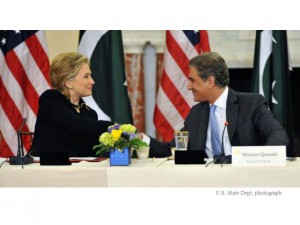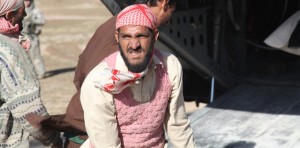“None of the funds made available by this act may be provided to any unit of the security forces of a foreign country if the Secretary of State has credible evidence that such unit has committed gross violations of human rights, unless the secretary determines and reports to the committees on appropriations that the government of such country is taking effective measures to bring the responsible members of the security forces to justice.”
Patrick Leahy, the first and only Democrat elected to represent the State of Vermont in the United States Senate, introduced what is commonly called the “Leahy Amendment” in 1997 as part of the Foreign Operations Appropriations Act. The Leahy Amendment, which applies to U.S. Defense Department and State Department programs that provide assistance to security forces in other countries, imposes a mandatory vetting and validation requirement on the Secretary of State. If the Secretary has credible evidence of human rights abuses by foreign security forces, she must certify that the government of the recipient country is taking effective steps against units credibly implicated in the alleged violations. The failure to do so means that military aid to the recipient government, or at the very least those units implicated in human rights abuses, will be withheld.
The law is sound in theory, but in practice the real impact on curbing human rights abuses is often tempered by the desire of the United States to advance its own security interests, even if at times it requires overlooking questionable human rights records.

Consider, for instance, the Pakistan Army units identified in carrying out extrajudicial executions in Swat as part of the offensive against Taliban militants in 2009 – 2010. According to international human rights groups, such as Human Rights Watch and Refugees International, the Pakistani military engaged in multiple violations. There was little if any advance warning to civilian populations in areas targeted for bombardment, often resulting in immense collateral damage, and as many as two million people were displaced from their homes during the Army’s protracted offensive. The U.S. State Department has documented reports of arbitrary and unlawful killings by government agents, including targeted killings of individuals as a result of extreme physical abuse while in government custody.
Secretary of State Clinton and Foreign Minister Qureshi meet in Washington, October 2010
In the “Strategic Dialogue” between Pakistan and the United States in October 2010, Secretary of State Hillary Clinton apprised her Pakistani counterpart of the Obama administration’s decision to withhold foreign aid to those “units” involved in human rights abuses, but the administration still proposed a $2 billion (USD) military aid package for Pakistan. What does that translate into in reality? For example, under bilateral training programs, the identified units become ineligible for participation after being listed in the Human Rights Vetting database. What is not clear is whether this process will be further refined to include human rights vetting on an individual level and, if that is the case, it would amount to opening Pandora’s Box.
If, however, this is unit specific, then one can only wonder what happens to those individuals transferred to and from the designated units who may or may not have any involvement in the specific human rights abuses. In short, the underlying intent of the Leahy Amendment is frustrated by the fluid organizational structure of professional armies – especially those inheriting their mantle from the British military tradition.
In principle and by law the U.S. government needs to take all necessary steps to ensure U.S. assistance is not provided to military units credibly alleged to have committed gross human rights violations. However, there are several issues that ought to be specifically addressed with respect to Pakistan. To begin with, the mechanism for disbursement of foreign aid within the Pakistani military is centralized. Therefore, it would be virtually impossible to ensure that no aid funds benefit the units that have been identified. This is a fundamental weakness in the execution of the Leahy Amendment as aid to the security forces as a whole directly or indirectly provides material support to all of its parts. Under that scenario, no amount of certification and validation obtained under the Leahy Amendment is likely to achieve the stated objective.

Pakistani men unload food from a U.S. Army helicopter in the Swat Valley in November 2010.
Secondly, it is unclear what the civilian government of Pakistan can do to bring these military units in line. The Pakistan Army, since 1958, has overruled – with express or implicit American blessing – civilian authorities. While generally well disciplined and professional, the Pakistan Army has a long history of excesses, though it is by no means unique in that respect. For instance, the Bangladesh liberation war – though revisionist scholarship now holds that those excesses were greatly exaggerated – the operation in Balochistan in the 1970s, and the operation against the Muttahida Qaumi Movement (MQM) in 1992 are just some of the examples of the Army’s human rights abuses against its own population. The Human Rights Commission of Pakistan and other humanitarian bodies claim that they discovered mass graves of militants killed extrajudicially by the Pakistan Army in Swat. Yet, given the Pakistan Army’s important role in supporting the American war efforts in Afghanistan, the goal of advancing respect for human rights is unlikely to weigh heavily on the actions of the policymakers in Washington. It is, therefore, unlikely that the U.S. Government will reconsider its approach to military aid to the Pakistan Army any time soon.
Indeed, to do so would be considered by Pakistanis as hypocritical given that other U.S. allies like India have committed equally brutal atrocities in Kashmir and against Maoist rebels in recent times. Already the controversial nuclear deal offered to India by President Bush and now the unstinted support by President Obama to India’s bid for a permanent seat on United Nations Security Council has established the perception that expediency often trumps ethics in U.S. foreign policy. Political pragmatism and geo-strategic interests are thus likely to sweep the Pakistan Army’s human rights violations under the rug. Pakistan will likely receive more F-16s to bolster its Air Force and continue to receive arms, ammunition, and military aid to carry out operations in Waziristan. Pakistan’s key role in the war on terror appears to help its civilian and military leaders abdicate their legal and moral responsibilities.
In the final analysis the problem with the Leahy Amendment is that it requires the Secretary of State to determine whether an incident of gross violation of human rights has occurred. This is problematic because the Secretary of State is guided by the predominate goal of his or her job: the self-interest of the United States. If the amendment is meant to be merely a tool for the Secretary of State to conduct foreign policy and obtain some measure of leverage against states with poor human rights records, then it may serve an important political purpose. If, however, the intent of the legislation is to ensure U.S. taxpayers are not funding atrocities committed by foreign armies, it looks a lot better on paper than it does in practice.
Ali Chishti is an investigative journalist and a counterterrorism expert based in Karachi, Pakistan.